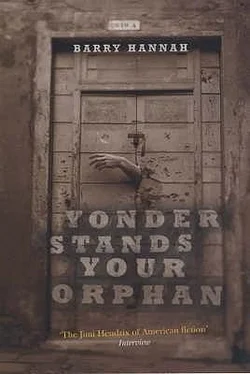Booth entered his mind, and he turned on Pepper’s old stool, where he lounged while Sidney was at the funeral. He suddenly thought Pepper stood behind him. He was shaken, all alone here in the store.
I give surgeons work, he thought. I take the vanity out of my friends’ lives. I make them face the music of their essential selves. Oh, it’s hard to be sincere these days. All these things I have done, and yet my work seems never to be over. Because this lake is mine and I didn’t realize it. I am expanding without panic or even plans. There’s many a little girl to be friends with out there. The ones that won’t rush you. My video work. A man that stays busy ain’t ever in trouble.
He looked about the store at all these expensive devices for pulling spiny, scaly meat out of the water. He didn’t understand it. Never had. Even doctors and rocket scientists at it. He was limp with innocence. He was no longer planning. Just heard a voice in his ear, getting louder.
Booth, I’ll cut your throat where you stand, and I don’t never have to ask why you look like this now. I could’ve done it before at the ball game. I let you go. You hearing me?
But he had nothing on him to cut with, and the nearest pocketknife fifteen feet away on the wall. What he loved now was a Pakistani three-quarter machete with a brown, green and yellow handle and golden gills on the blade. But it was in the car and remained only an exquisite hypothesis even when it was in his hands.
His own pool, his houses, his spirit. When he was certain nobody was in the store, he said to himself, “Hardly anybody does anything by hand anymore.”
It was a strange vacant bright day, this funeral day for Nita Harvard. Not a speck of a man or woman, not a single fishing boat out there on the water. The wind was out of the east and the fishermen knew it was hopeless.
“We come to begin a church and send away a neighbor to what this church and all love is about,” began Byron Egan. The trombones had just quit, and unknown mourners were present just for them, the band without even a name. Brown, yellow, black faces, posing as friends of Nita and Harvard, or now of her corpse. Nita had never been a mingler even when healthy.
Egan had had a difficult time with this one, and he felt he was turning into liquid in front of Max Raymond, harsh witness, and his lot.
“She did not go to church,” he said, “but Nita Harvard, what I hear about her, lived a life that deserves a cathedral. Her sense of humor, her fairness, made life more lovely and lively for those around her. What else can we demand of a neighbor? Flowers, tennis, a life graceful and generous. Even so, old fool cancer got in her and really tried to lay her low. But now where is she? High, high in a new church, launched toward heaven with its new friends and old.”
At first Harvard thought it might be a sort of tag-team eulogy, with Peden stepping up, but this man only brought a tape of Nita’s favorite tunes. “I’ll Be Seeing You,” “What’s New?” These went across nicely on a big Sony jambox, and the funeral was over except for the churchyard cemetery with its small tent over her loamy slot. She had barely looked at the church while living. She practiced a distanced Episcopalianism and did not especially like people.
Mortimer could see the church, a white thimble across the bumpy water blown easterly from the bait house.
Somebody he was talking to and hustling years ago told Mortimer there was a town at the bottom of the lake. He thought of his own town in Missouri. He imagined it underwater. His parents’ hair straining upward, circled by the corpses of suspended chickens. His parents were wearing their postal outfits. Stupid in this fixed image, they had a kind of hopeless love on their faces and no opinion at all. They neither cursed God nor acknowledged Him. In death, if they were in fact dead, they carried on, changing nothing, being nothing, walking their gray lives along the rut in the ground.
Mortimer could live on no middle ground. The fact that his last fight had reduced him nearly to ectoplasm terrified him. He had a nostalgia for himself. Now he toiled with the binoculars and cursed eagles who intervened between his eyes and the pleasure barge.
Harvard manned the boat, still alone with the boys on his way back to the cove dock. He did not want travelers. This was duly noted by half his friends, who had dressed less for the funeral than for the pontoon yacht ride and were ignored. Some had worked on the new craft and were angry. There can be no second maiden voyage, and having to wait on the shore struck them as rude and unfair. They watched these yard pups go solemnly with him in their new little-man suits; many groused.
Mortimer, with the big Pakistani blade, walked slowly, bently down to the cove. He saw the willow sticks budding where the snakes had lain. Where he had fallen and shrieked. The pontoon boat chugged without hurry its three miles. The boys had never had this view and it made them children again, knowing where they lived from the water’s point of view. They felt tiny and good. They were proud of themselves for holding out against this waving mass their long years.
“Hidey,” said Mortimer from the winter willows. “You ain’t trying to land on my side of this lake over here, are you?”
They saw the big blade and were only thirty feet from his face.
The head was floating toward them, the singer’s tall waved gray hair and the smaller creased face. He might now be Earl Clyde, lounge hawker and crooner, sixty-five and still going, reaching deeper and deeper into his throat for a tune. They saw the blade but then only his shoes, a spangling black pair of opera slippers. Could they be? Only Harvard knew what they were and doubted his eyes.
Who could remember a gun in a launch amid boarding his wife’s casket, the funeral, the suiting up of the boys, the pouts of old friends when they couldn’t come aboard, the sermon and music by bike scum, one of them with a black tattooed cross on his cheek? Who could remember?
The boys had the pistol. They had never forgotten. Isaac raised it, the original bullets in it. Five of the eight went off, but the child was no shooter. So he got Mortimer only once through the earlobe on the left, which hurt a great deal. His hand went to his ear and he howled briefly, the blade spinning as he let it go, nicking him across the shin.
Harvard saw a great deal of smoke for such a small black gun. He could not believe any of the five shots had hit nearly what was meant by it. He wheeled the boat into the dock but was all over the place, like a semitrailer on ice, berthing it.
He recalled the head shrieking in the willow sticks and now the thin body beneath and the opera slippers dancing on the early spring grass. The thing went up the hill like a black goat. The boys were fascinated. Mortimer was so much littler, benter. He could not move very fast, but he loped now to his car, holding his ear.
Harvard docked the boat with their help on the lines. He was having a stupid dream in which the boys were not at fault. He wasn’t over the shock of Isaac firing the weapon. He was no longer particularly sad or angry.
Melanie, outside her kitchen door, looked down to them with a hand over her eyes against the western sun. She waved.
She was dressed well, in black. He didn’t know whether she had been to the funeral. But he had been conscious of her the entire day. Released to feel what he would.
IN THE BAIT STORE THE PARENTS OF MAN MORTIMER were waiting. Lloyd, Edie and little Marcine were in the store too, with the elder Mortimers, who had just shown up at the car agency. They had come in a long old Ford wagon with canaries caged in the back. The gang was fascinated.
Читать дальше











